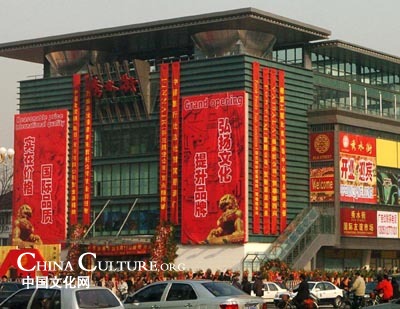
Xiushui Street after renovation.
"That ruling accelerated our efforts in fighting against counterfeiting," said Wang, who is an MBA graduate. Meanwhile, he believed that getting rid of counterfeits and piracy from China would need long and continuous efforts.
"There used to be 100 percent fake brand products in Xiushui before the renovation, but now we have a lot of genuine producers especially traditional Chinese brands," he said.
According to an online survey conducted by the market, silk articles tops foreign tourists' shopping list of buying souvenirs in China, followed by pearls and handicrafts. "So we now have two stories selling pearls and jewelry, and we have the largest Chinese tailor shop."
Besides these popular goods, Xiushui has a group of foreign language-speaking salespeople to serve customers from all over the world, so there is no language barrier in any of the shops. After training, nearly every shop assistant can speak fluent English to shoppers, and customers will meet no difficulty shopping if they speak any of the eight major foreign languages in the market.
For many customers, being in Xiushui is not just about shopping.
"Bargaining is so much fun!" exclaimed Amna and Fatina Pirzada from Pakistan, who enjoyed slashing prices. "When there was a difference in prices, they [shopkeepers] would give a smile. People are very friendly here."
Bargaining is the rule at many markets in Beijing, and this convention is a must in Xiushui.
"Every aisle in Xiushui is like a hutong in old Beijing, so people come to this market as if they are taking a trip to know Chinese culture," Wang said.
Earlier this year, Xiushui Street publicized its first self-owned brand, the Xiushui Market, selling shirts, tea leaves, ties, chinaware and other articles under the trademark.
By Li Qian